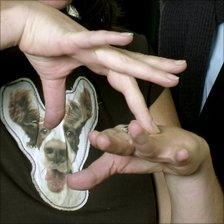Deaf people's 'beautiful finger-signing' recorded
- Published

The documentary has been made amid changing use of signing
Older sign language users' skills in spelling out individual words with their fingers have been recorded before the method disappears.
Finger-spelling has been declining, according to Highland Council's Deaf Communication Project.
Backed with almost £50,000 from the Heritage Lottery Fund, the project team have been documenting the stories of profoundly deaf people in the north.
They include sign language users in the Highlands, islands and Moray.
A documentary cut from nine hours of raw footage will be shown at Eden Court in Inverness on Friday.
Project manager Jenny Liddel said there was a "compelling need" to make the film now because the way people sign has been changing.
She said: "Older deaf people don't use as many signs, but instead use their fingers to spell out individual letters.
"It sounds like a slow way to communicate, but in fact it's amazingly fast and beautiful to watch, and its part of our heritage.
"We wanted to capture this wonderful communication style on film while we still can."
Researchers Jean Pentland and John Montgomery interviewed 15 deaf signers.
Ms Pentland said it was important to record the use of sign language in the same way as Gaelic has been.
Those interviewed included Lena Hay, from Elgin, who recalled how local variations of sign language could have embarrassing misinterpretations.
She said: "At the Milan Deaf Olympics in 1957, I was chatting to an American girl and I used my Scottish sign for 'lemonade'.
"She was very shocked because to her that was the sign for a very rude swear word."
Minority language
Colin McLean, head of the Heritage Lottery Fund in Scotland, said: "I am delighted that HLF has been able to help capture the legacy of Highland finger-spelling before it dies out completely.
"This film is not only extremely interesting and educational for all but will, I'm sure, give deaf people a stronger affinity with their identity through greater understanding of their history and traditions."
In 2009, a professor argued that signing should be treated as an indigenous and minority language.
Prof Graham Turner, of Heriot-Watt University in Edinburgh, said records of sign language in Britain could be traced back to 1575.
Two years ago about 50,000 people were using sign as their first or preferred language in the UK, fewer than speak Gaelic or Welsh.
Prof Turner said in terms of numbers of users and political support it received, it was in a minority.
He also said there had not been the same scientific studies of signing as spoken languages.